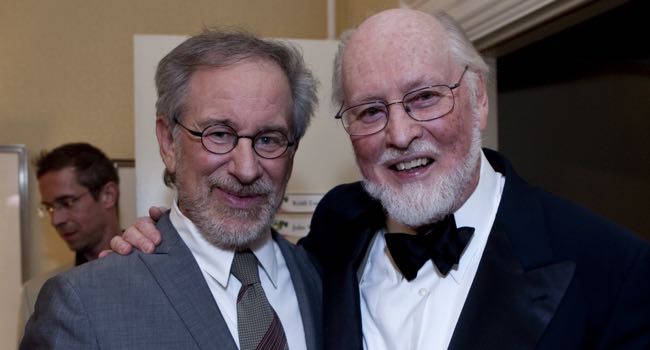By Ray Bennett
LONDON – ‘My hope is that I can work with Steven for many years to come,’ composer John Williams told me. That was in 2000 by which time he had written the scores for sixteen Spielberg-directed movies starting in 1974 with ‘Sugarland Express’. Since then, he has scored thirteen more including this year’s ‘The Fabelmans’ and he was music consultant on last year’s ‘West Side Story’, which of course had music by Leonard Bernstein.
In a short break from their collaboration, Williams scored Brian Percival’s 2013 picture ‘The Book Thief’ and a handful of ‘Star Wars’ vehicles while Spielberg used Alan Silvestri on ‘Ready Steady One’.
The five-time Oscar-winning composer, now 91, told me he never took their collaborative closeness for granted. ‘I never make the assumption that he will not want to have another sound, or another composer to do one of this films,’ he said. ‘Should he wish to do that, it would be something I would salute and honour. I wouldn’t say welcome, but I would certainly honour his wishes and most of all respect them.
Even twenty-three years ago, Williams noted, ‘It’s probably the longest standing collaborative relationship of this kind that I know of in our world. It makes me feel enormously fortunate and lucky because he is a very great man, one of the great filmmakers of the period. Our association has been, for me, an absolutely rewarding, life-enhancing experience.
Williams told me that Spielberg, 76, hadn’t changed over the years. ‘We’ve really gotten along miraculously well from day one, I must say,’ he said. ‘He’s a very sympathetic and sensitive and warm person who’s as unspoiled and focused now as he was when he was a youngster, just 23 or 24 years old coming through the studio gate. He’s the same person today; same enthusiasm and the same energy, same straightness and lack of pretension.
Williams said that his score for ‘Close Encounters of the Third Kind’ represented an artistic breakthrough for him. ‘Particularly in the second half of the film,’ he noted. ‘The music for that film started out in quite a conventional way and then it sort of took a left turn as the film did. It became more and more fanciful, if you like, with the use of voices and electronic effects; auto horns turned backwards to match the lights of the spaceships; the orchestra doing polytonal and atonal kinds of gestures to introduce an otherworldly but beneficent kind of atmosphere that the arriving creatures seemed to bring with them.’
But he had no doubt that his score for ‘Jaws’ kicked things off. ‘It was the beginnings of our relationship really,’ he said, ‘and a lot of opportunity came my way as a result of it, including ‘Star Wars’. Steven introduced me to George Lucas and he was directly responsible for that relationship developing. The success of the ‘Star Wars’ films brought unbelievable opportunities. I worked for quite a few years with the London Symphony Orchestra on the “Superman” films and the “Indiana Jones” films. These experiences early on with those films were rich and brought with them unimagined rewards in future years for me personally.’

